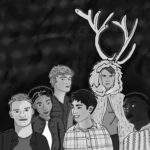I’m over at Rosemary’s book blog, Mom Read It, discussing the adoption themes which can be found within my series. Adoption is an important topic to me because my two younger sisters are adopted from China. Before I even started the book series, I knew I wanted to portray a positive adoption outlook between adoptive parents and adoptees in my books.
For those who know me and my family, they can see little facets of my siblings, my parents, and myself in the way certain characters interact. Merry for instance is very much a representation of my mother. The nightly tea parties, which are seen in Zaria Fierce and the Enchanted Drakeland Sword, are something she did with one of my sisters before my sister went off to college.
To read more about this topic and how adoption affects Zaria Fierce and Aleks Mickelsen in similar, but different ways, head over there for a deeper look. Be sure to leave a comment while you’re there because one lucky winner will get a Fierce Scale necklace from me, in the color of their choosing. Will you pick a color that reminds you of a dragon like Fritjof, a winter-wyvern like Norwick, or a river-troll like Bjarke? So many fun options!

Rosemary also had some wonderful things to say about the fourth book in the Zaria Fierce Series. Here’s a sneak peek:
I have wanted to know more about Aleks since I first read that he was a changeling – and that his grandmother is, too! Readers won’t be disappointed; we learn more about Aleks’ origin here, and I love the inner conflict raging with Aleks as he realizes that there is no black and white situation: he initially thinks it’s not a big deal at all to give up his fey gifts, but learns that not only can his ability to find things be a huge help, he learns that his fey side is very much a part of him. Don’t know what you got ’til it’s gone? Aleks may just have to learn that lesson that hard way.
You can read the full review for Aleks Mickelsen and the Twice-Lost Fairy Well on her blog. Thanks, Rosemary!





